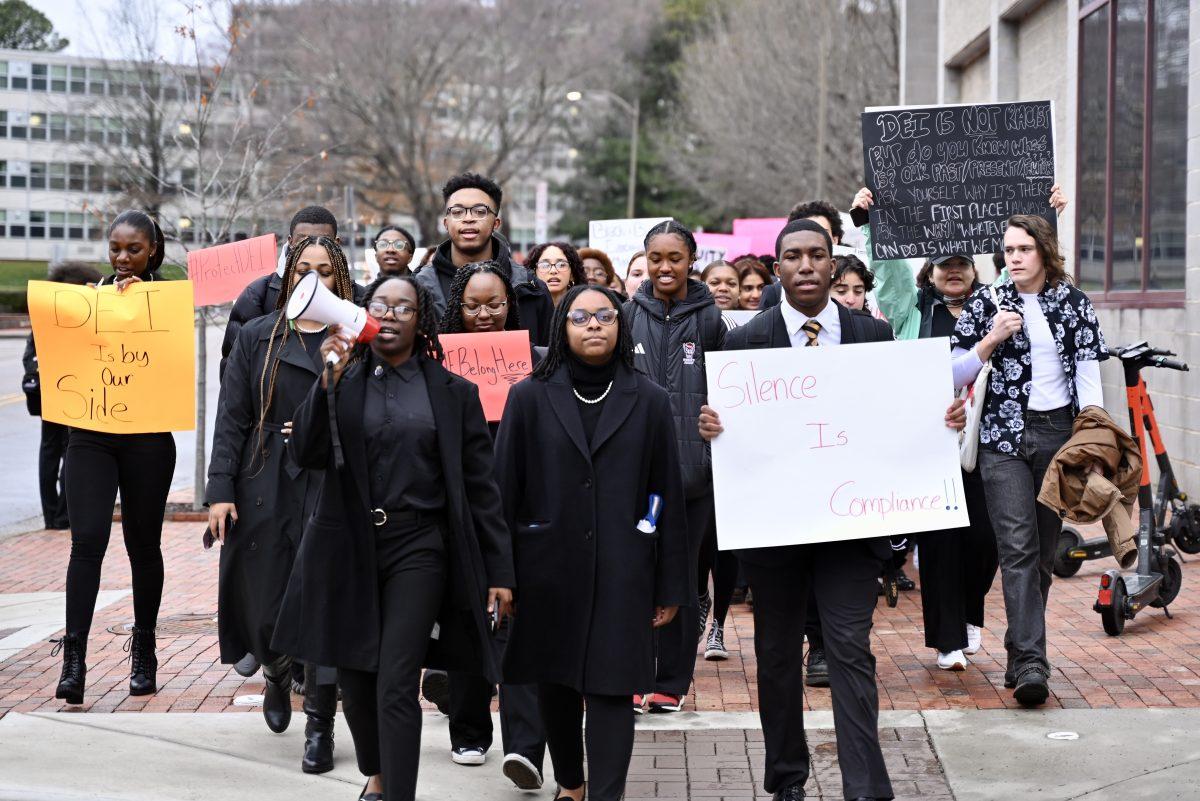Around 50 students gathered to march in protest of the recent suspension of diversity, equity and inclusion course requirements across the UNC System Wednesday afternoon. Organized by the National Pan-Hellenic Council, the march began at Witherspoon Student Center and concluded at Talley Student Union.
The protest was a direct response to a memo issued by the UNC System last Wednesday, which suspended all DEI-related course requirements following an executive order by President Donald Trump. The memo stated that such requirements could jeopardize federal funding and instructed universities to convert DEI credits into general electives.
Despite temperatures below 40 degrees and rain, students showed up to voice their opposition. Nayah McKenzie, a third-year studying criminology and an event organizer, said the purpose of the protest was to give a voice to students who opposed the UNC System’s decision.
“[We’re here] to make a statement,” McKenzie said. “This is something that is coming down from the federal level and we just don’t agree with it. We understand we’re a state school. We have to conform to certain standards. However, we don’t have to agree with the standards.”
Tremiyah Wilford, a third-year studying animal science, said the DEI requirement cuts diminish the value of DEI in education, addressing the protesters ahead of the march.
“Diversity, equity and inclusion are not optional,” Wilford said. “They are necessary. DEI courses are not electives, they are requirements because learning about different cultures, perspectives and histories is essential to a complete education. Without DEI, our education is dishonest, incomplete and unjust.”
Lance Patterson, a third-year studying business administration and an event organizer, highlighted the significance of DEI education in the preservation of Black history.
“As Black men and Black people in America, our history needs to be heard about,” Patterson said.
Although the march was organized by leaders from the Divine Nine, a collective of historically Black Greek-letter organizations, McKenzie said the impact of the changes goes beyond the Black community.
“This is about more than just a certain community,” McKenzie said. “It affects everyone, depending on your gender, race or disability status.
Mariah Simmons, a third-year middle grades education major and an event organizer, expressed her concern about the long-term consequences of removing DEI requirements.
“As an education major, this heavily impacts my future for my [students],” Simmons said. “I don’t know what aspects of history they’re going to learn at this point. I don’t know what the future holds for them. There are parts of history that are going to be left out for everyone with just one bill signed. Thousands of future teachers — teachers being produced here — they’re going out into the world and not knowing aspects of education in our history.”
McKenzie said the march’s attendance demonstrated the power of collective action, drawing students from various backgrounds and disciplines.
“My heart is warmed by how many people came out,” McKenzie said. “You see the diversity amongst us and it shows why diversity, equity and inclusion are of the utmost importance.”
McKenzie emphasized the historical role of the Divine Nine in organizing protests.
“We’ve been on the forefront since the beginning,” McKenzie said. “Our organizations were built off the struggle that our people have gone through. The thing that’s interesting is when it comes to the Divine Nine and the Black struggle, it’s a struggle for all. As long as we have rights, everybody has rights.”
Simmons said the Black community at NC State is integral to conversations surrounding civil rights.
“We only make up 5% of the people on this campus, so having this amount of impact speaks volumes to who the Divine Nine is and what we represent,” Simmons said. “Our founders worked so hard to allow us to continue their legacy and keep this impact going. It’s an honor to keep doing this for our founders and for all.”
Jordyn Kettisack-Lee, a fourth-year studying social work, challenged the University’s decision-making process in suspending DEI course requirements.
“NC State has a choice,” Kettisack-Lee said. “I understand we are a land-grant school, but we don’t need federal funding necessarily. We have enough donors and alumni to keep us going sufficiently, so for them to go along with this is being compliant in racism.”
Kettisack-Lee said DEI is pivotal in getting a rounded education and helps offset systematic oppression.
“For DEI, it’s a lot about our history and our education as Black and brown people,” Kettisack-Lee said. “America was built on the backs of Black and brown people and I think that’s important to be taught within schools and also how systemic racism plays a role into how we operate throughout society and how that there have been things that have oppressed us and DEI allows us to overcome some of those oppressions.”
The UNC System Board of Governors has defended its decision as necessary to maintain institutional neutrality on politically sensitive issues.
Daaven Lorick, a third-year studying business administration and an event organizer, affirmed the attendees’ efforts to see DEI requirements reimposed before the group began their march.
“This is our university,” Lorick said. “This is our education and we will fight for it.”
Elliott Jackson contributed to this reporting.













